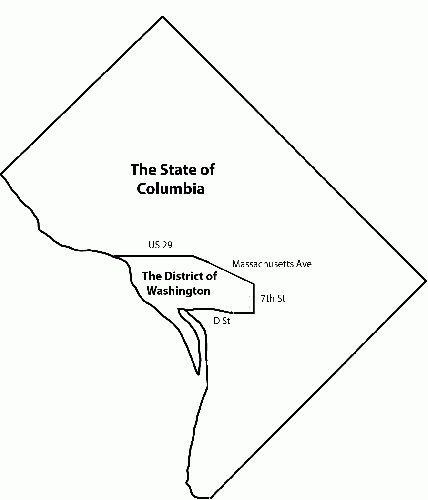American citizens in the District of Columbia have no political power on important national issues. They have no Senators, and no voting member in The House.
There is a reason for it. The US Constitution, Article I Section 8, provided for the establishment of the seat of federal government at a location separate and independent of the states, in order to avoid advantaging one state by its presence. So the prospective site of Federal power, to be the District of Columbia, was deliberately chosen at location that was swampy, malarial, and largely uninhabitable, even by contemporary standards.
Washington, the District of Columbia, was established in 1790. Roughly half of the original district was carved out of Maryland, and half from Virginia. The Virginia part was returned to Virginia by a vote of "retrocession" in 1847 -- which, importantly, established a precedent of flexibility for how the district can be treated. Keep that in mind.
In 1790 there would have been no anticipation of a significant population in D.C., which would be deprived of full citizenship just because they resided there.
That is where we are now, with a population of about 700,000 significantly un-empowered American citizens. And so there is mounting pressure to modify the district once again, this time to grant full suffrage to the inhabitants. The House of Representatives recently voted to make D.C. a state, but the Senate declined to act, and the matter now rests with the new Congress.
Opponents of the movement for D.C. statehood are right to object that it would go against the well-reasoned intent of the Framers of the Constitution to avoid favoring, by its presence, one state over all the others. But it would be fully congruent with the Original Intent if the population would be separated from the seat of federal government -- by the creation of a sort of American-style Vatican City, encompassing just the federal institutions of D.C.
No Constitutional issue would remain with such a strategy. Instead of a Washington D.C. we could have a federal District of Washington and a separate state of Columbia. The federal district of Washington could thereby be fully neutral and independent from the new state, and without perpetuating the present disenfranchisement of so many of our citizens.
Fortunately, the federal institutions in D.C. are neatly concentrated. A likely boundary between the federal District and the 51st state could run east from the Potomac along US 29 to Massachusetts Ave, then south on 7th St, then west along D St to the river.
Such a solution would serve the original intent of the Framers while giving generations of citizens suffrage equal to all those in the rest of the Union. Some Democrats might object to giving full enfranchisement to fellow citizens if the district would favor the Republican Party. Some Republicans might object because it is actually heavily Democratic. But true Americans would put country first and insist that every American must have full representation in Congress.Would re-naming DC be a problem? Think of all the maps and signs that would have to be re-done. Would that be a deal-breaker? No! The place could still be referred to as "DC" -- meaning "the District and Columbia"!
There are more people in D.C. than in Vermont and in Wyoming. Who with a genuine sense of patriotism would oppose an expansion of full American citizenship to so many of our fellows and fellowes, in a way that would preserve the original intent of The Founders?
Americans, step up! Partisans, step down!






